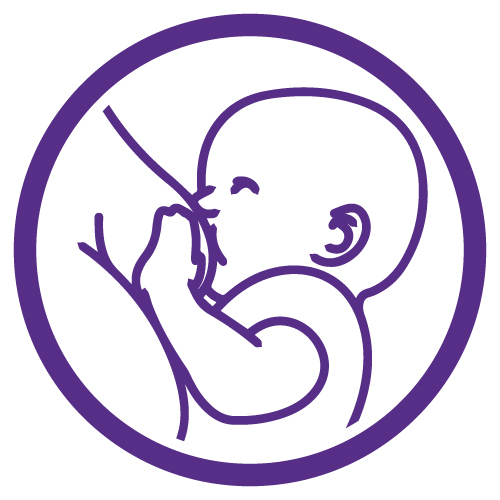 Lactation & Breastfeeding Online Course(s) & Continuing Education
Lactation & Breastfeeding Online Course(s) & Continuing Education
Access the latest clinical skills and research for Lactation & Breastfeeding for professional training. These Lactation & Breastfeeding online courses provide practice-changing skills and valuable perspectives from leading global experts. This Lactation & Breastfeeding education has been accredited for a variety of CEUs / CERPs and can be accessed on-demand, at your own pace.


Nancy Mohrbacher was born and raised in the Chicago area, where she lives today. She is a board-certified lactation consultant who has been helping nursing mothers since 1982. Her breastfeeding books for parents and professionals include Breastfeeding Answers Made Simple and its Pocket Guide; Breastfeeding Made Simple(with Kathleen Kendall-Tackett); Working and Breastfeeding Made Simple; and Breastfeeding Solutions and its companion app for Android and iPhone.
Nancy currently contracts with hospitals to improve breastfeeding practices, writes for many publications, and speaks at events around the world. Nancy was in the first group of 16 to be honored for her lifetime contributions to breastfeeding with the designation FILCA, Fellow of the International Lactation Consultant Association.
Topic: Applying Bioethics to Milk Banking and Milk Sharing - [View Abstract]
Topic: Concerns About Low Milk Production - [View Abstract]
Topic: Transitioning the Preterm Infant to the Breast - [View Abstract]
Topic: Using Gravity-Assisted Positions to Prevent Early Breastfeeding Problems - [View Abstract]
Topic: What Mothers Need to Exclusively Breastfeed - [View Abstract]
Topic: What's New In Lactation - [View Abstract]
This session provides a summary of the 7 universal principles of bioethics and examples of how they apply to milk banking and milk sharing. It also offers an analysis of the evidence that supports the use of pasteurized donor human milk with preterm babies and examines the range of milk-sharing options and the ethical and practical considerations for parents and breastfeeding supporters.


Marsha is a registered nurse and international board certified lactation consultant. She has been assisting breastfeeding families in hospital, clinic, and home settings since 1976. Marsha is the executive director of the National Alliance for Breastfeeding Advocacy: Research, Education, and Legal Branch (NABA REAL). As such, she advocates for breastfeeding at the state and federal levels. She served as a vice president of the International Lactation Consultant Association (ILCA) from 1990-1994 and in 1999 as president of ILCA. She is a board member of the Massachusetts Breastfeeding Coalition, the US Lactation Consultant Association, and Baby Friendly USA, USLCA’s representative to the USDA’s Breastfeeding Promotion Consortium, and NABA REAL’s representative to the US Breastfeeding Committee. Marsha is an international speaker, and an author of numerous publications including ones on the hazards of infant formula use, Code issues in the US, and Breastfeeding Management for the Clinician: Using the Evidence.
Topic: Nipple Nuances: From Pain to Peppermint and What the Textbooks Don't Cover - [View Abstract]
Medical ethics is a foundation of clinical practice. While we all strive to practice in an ethical manner, there are a number of situations and issues that arise which may challenge our ethical principles. This presentation explores the application of medical ethics to clinical lactation practice.

Assisted Nursing: Supporting Breastfeeding Infants With Craniofacial Anomalies

Indira has been involved in birth and breastfeeding support for the past 15 years. As a clinician IBCLC, she leads the Specialist Breastfeeding Clinic which is part of the Merton Health Visiting team (Central London Community Healthcare NHS Trust). This Clinic is for complex breastfeeding dyads and by GP/HV/RM referral only. Indira has been awarded the National Institute for Health Research Fellowship (2021-2022) as part of the ARC NWL Improvement Leadership programme. Her project examines how to offer more skilled breastfeeding and lactation care in the NHS nationally. As an Educator and the lead Lecturer of the Breastfeeding London Course, she has been training future IBCLCs for the past 10 years. Indira's roles as Clinician and Educator have led her to the path of research. As the Director of the Centre for Breastfeeding Education and Research, she has published several articles in leading international peer-reviewed breastfeeding and human lactation journals. She has also served La Leche League Great Britain for the past 13 consecutive years.
Craniofacial anomalies (CFA) are a common anatomical malformation that affects the craniofacial region; they present either as cleft lip (CL), cleft palate (CP), or cleft lip and palate (CL/P) with varying degrees of severity. The incidence depends on the population’s ethnicity and geography. Infants with CFA can experience feeding difficulties either at the breast or at the bottle because they can have issues with their suck, swallow, breathe sequence and milk transfer.
This presentation will provide an overview of the anatomy of CFA. Techniques on how best to support families with CFA infants who wish either to breastfeed, maintain lactation or transition towards breastfeeding post-surgery will be discussed. Health care professionals involved in the care sometimes lack the expertise of supporting breastfeeding and often only recommend maternal pumping and specialised bottles. There is limited research about feeding infants with CL/P directly at the breast.
A clinical case will be presented to illustrate clinical techniques and sequence of care.

View Details / Enroll
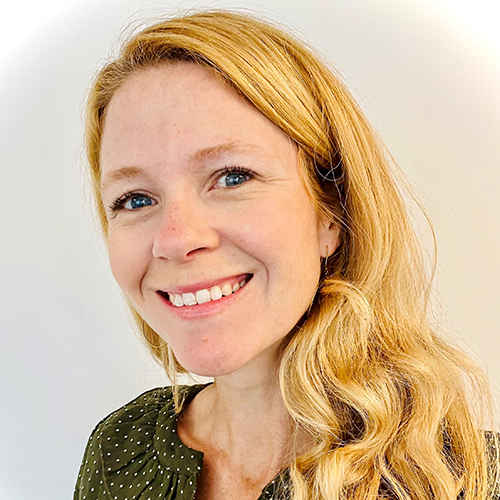
At-Breast Supplementation: Practical Tips for Using a Variety of Supplemental Feeding Tube Devices

Johanna Sargeant is an International Board Certified Lactation Consultant, teacher and writer based in Zurich, Switzerland. She is passionate about utilising her background in education, biological science, psychology and language to empower parents with empathetic support and evidence-based information through her private practice, Milk and Motherhood.
Originally from Australia, Johanna provides much-needed English-speaking support to many thousands of parents throughout Switzerland and across Europe, and has recently been writing new education modules for the European Society of Paediatric Research and the European Society of Neonatology. She has taught at the University of Zurich, has spoken as a panelist for the WHO's Baby Friendly Hospital Initiative congress in Geneva, has been an expert speaker and facilitator for Google, and has presented at a wide variety of international conferences. The complexities of her personal feeding experiences fuels her passion for providing knowledgeable, guilt-free infant feeding support globally.
Topic: Mastering Lactation Conversations: Creating Successful and Achievable Care Plans - [View Abstract]
Topic: Seeing the Bigger Picture: Finding Clues in Our Breastfeeding Clients' Surroundings - [View Abstract]
Topic: When Evidence and Empathy Aren't Enough: Changing Your Lactation Practice to Boost Client Success - [View Abstract]
Using an at-breast supplementer is often thought to be annoying, complicated and unsustainable -- but it doesn't have to be! While many lactation consultants are aware of the benefits of supplementing directly at the breast, many admit to feeling overwhelmed, and few actually use it with their clients. With this presentation, you will learn the specific benefits and barriers to this form of supplementation, view demonstrations of a variety of these devices, and learn some tips and tricks to make this at-breast supplementation feasible and sustainable for families. We all need to feel comfortable recommending and teaching the use of these tools, enabling us to foster the best overall health for the families we support.

View Details / Enroll
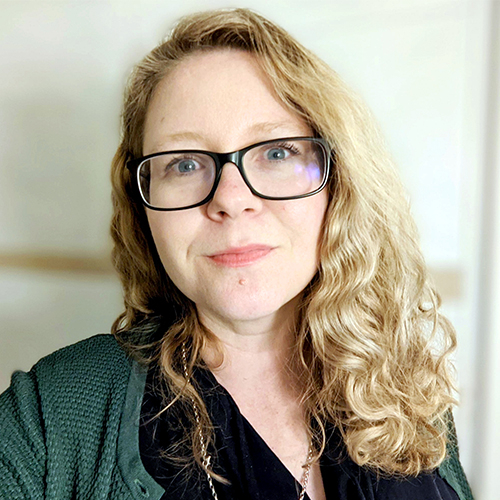
View Details / Enroll

Avoid Lawsuits and Pink Slips! Legal and Ethical Issues for the IBCLC

Liz Brooks is a private practice International Board Certified Lactation Consultant (IBCLC) and licensed lawyer, with expertise in criminal, administrative, non-profit, ethics, and lactation-related law. Liz offers in-home lactation consultations, and bedside care and teaching in two Baby-Friendly-designated hospitals.
She has been a leader in organizations for IBCLCs, breastfeeding promotion, and non-profit human milk banking. She authored the only textbook on legal and ethical issues for the IBCLC, and writes on health care ethics, equity, and conflict-of-interest in several books, blogs, and peer-reviewed journals.
She is a popular international conference speaker, offering practical tips with wit and wisdom for anyone who works with lactating and human milk-using families. Liz self-identifies as a cisgender hetero white woman with unearned privilege, and uses she/her/hers pronouns.
Topic: Using a Cool Head When You’re on the Hot Seat: Ethical and Legal Topics That Make Us Sweat, and How to Avoid Getting Burned - [View Abstract]
Topic: What’s Too “Friendly” for an IBCLC on Social Media? - [View Abstract]
Topic: Whiners and Deniers: Ethics and Diplomacy in Difficult Cases - [View Abstract]
This presentation is a first of its kind: a "survey course" of legal and ethical tensions unique to the IBCLC. Regardless of one’s other professional licenses or credentials, there are four primary practice-guiding documents for the IBCLC. After a review of those “rules of the road,” we’ll navigate a simple algorithm the IBCLC can use to determine what she could, should or must do, in any situation that sets off ethical red flags in the IBCLC’s mind. Then, we’ll hit highlights of legal and ethical issues for the IBCLC: certification vs. licensure vs. certificates-for-classes-and-courses; who is the patient/client?; conflicts of interest (and tensions from “wearing many hats”); intellectual property law; the (WHO) International Code; the IBCLC in the courtroom (as expert or witness); the IBCLC on the Internet; the IBCLC as breastfeeding advocate, and its corollary: the IBCLC as advocate for a breastfeeding mother.

B Theory of Breastfeeding: Baby-Breast-Brain-Backup Axis (Mindfulness-Based Stress Reduction)

I am the mother of three breastfed children. Certified as an IBCLC in 2007, the next year, in 2008, setup the first IBCLC clinic in the medical center in Taiwan. As the President of the Chinese Lactation Consultant Association from 2015 till now. I have been teaching in the university for 30 years and as a part-time associate professor in the Department of Midwife & Women Health, National Taipei University of Nursing and Health Science, Taiwan now. After I retired from the university, I fund and as the CEO of WELL International Co., aims to promote the three-stages certification of profession lactation support competence.
Topic: Communications/Connection and Conflict Resolution Within the Extended Family - [View Abstract]
Breast is best. The World Health Organization recommends that exclusive breastfeeding for at least the first six months after birth. Breastfeeding 10 times a day and each lasts for 30 minutes for 180 days; that sum up to 54,000 minutes devoted for "healthy next generation". Wang (2008) propose the B theory of breastfeeding: Baby-Breast-Brain-BackUp axis, an interpretation and application of the lactation mechanism with a new perspective. Breastfeeding is involving physical, psychological and social aspects of life. How does the lactation consultant based on counseling skills, apply the Mindfulness-Based Stress Reduction (MBSR) to empower breastfeeding women, who can activate the positive brain feedback, prompt oxytocin reflexes, and bravely express individual needs. A breastfeeding friendly society therefore be fostered and the breastfeeding family could truly enjoy their breastfeeding goals & lives.

View Details / Enroll

View Details / Enroll

Babies Cry to Communicate, Not to Manipulate... Non-Medical Reasons for Crying: An Anthropological Approach

Katrien Nauwelaerts graduated as a prehistoric archaeologist in 2005. She's the mother of three breastfed children and the administrator of the Dutch breastfeeding-website Borstvoeding Aardig, https://borstvoeding.aardig.be. Katrien worked as a volunteer breastfeeding-counsellor, provincial coordinator and training manager for the Belgian breastfeeding organisation Borstvoeding vzw between 2010-2014. Up tot 2018 she was the founder and president of Aardig Leven vzw, a non profit ecological organisation. In 2013 she became an IBCLC. Since 2013 she's working as a lactation consultant at her own private practice Borstvoeding Aardig. She became a nutritionist and a herborist in 2014. Katrien shares her experiences and knowledge on lactation consulting as a public speaker since 2014.
Topic: Breastfeeding and The Use Of Herbs - [View Abstract]
Topic: Young Mothers and Breastfeeding in Belgium - [View Abstract]
There is scientific research that says that breastfeeding duration shortens when parents experience their baby as a baby who cries a lot.
There are all kinds of medical reasons why a baby is crying. Crying is a way of communication for a baby. It's a cry for help.
But what if there are no obvious medical reasons for a baby's crying behavior?
This lecture explains sociological and anthropological factors that can influence crying behavior in babies.
Sometimes parents have false expectations about parenting and baby behavior. Sometimes cultural assumptions make parents believe they have a crying baby when they actually haven't. And some cultural or anthropological parameters can strengthen the crying behaviour in a baby. Learn more about normal newborn crying behaviour and how to help parents understand their newborn.
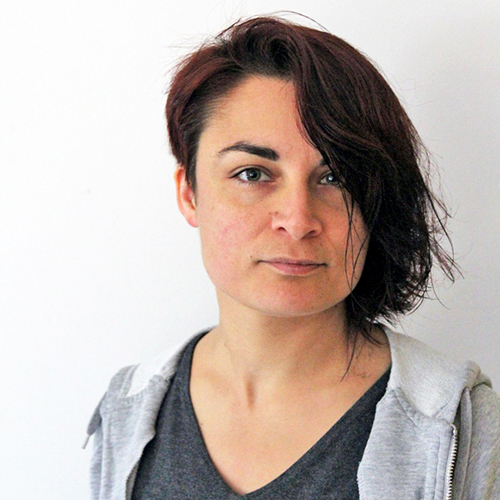
View Details / Enroll
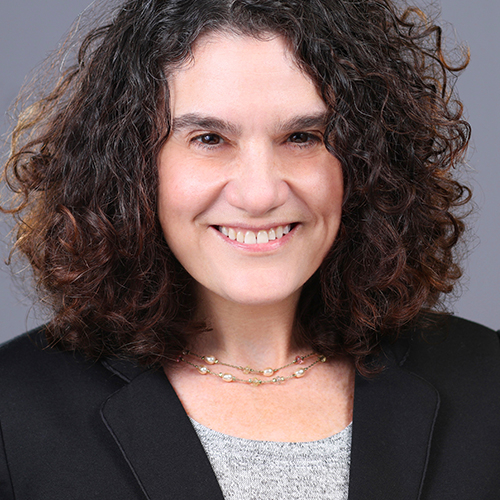
Babies With Suckling Dysfunction: Assessment and Coordination of Care

Leslie has been providing lactation support in Central New Jersey for over 18 years - as a La Leche League (LLL) leader since 2002, an IBCLC at Mercer County WIC from 2014 to 2016, and as a private practice IBCLC since 2011.
Leslie grew up in New York and New Jersey. She graduated from Cook College/Rutgers with a BS in Biochemistry, and from Rutgers University/UMDNJ with a PhD in Biochemistry and Molecular Biology. Leslie's difficulties with early breastfeeding, the help she received from LLL, and challenges with returning to work laid the foundation for her understanding of the importance of skilled and compassionate lactation and infant feeding support.
Topic: Untangling the Big Picture of Tongue-Tie Assessment - [View Abstract]
IBCLCs assess chest/breast and bottle feeding skills and infant’s oral and body anatomy, and the motions that contribute to, or inhibit, the process of feeding as well as post-feeding comfort (digestion and elimination for infant, breast comfort for parent). When infants present with feeding dysfunction, the root of the issue could be from a variety of sources - effects of in utero positioning, prematurity, effects of birth interventions, tight frenulum (ties), asymmetric/tense muscles/fascia, neurological/ reflexive issues, low/high muscular tone, or suckling discoordination, suck-swallow-breathe discoordination, laryngomalacia, compensations for low supply, cleft lip/palate, and more. IBCLCs help families navigate the differential assessment of feeding dysfunction, and at the same time support the family’s feeding and milk supply choices.
This presentation will examine the role of the IBCLC when suckling dysfunction is occurring - for example aiding with latch and bottle feeding, oral/body exercises, referrals for oral evaluations and/or bodywork, or help with frenotomy pre/post work if needed. IBCLCs adjust the care plan as the infant’s feeding skills and parents’ goals grow and change. Developing the skills to aid oral function, and coordinate with specialized practitioners to aid this process, is crucial in order to determine the best course of clinical care, meet the families needs, and allow for the best possible outcome.
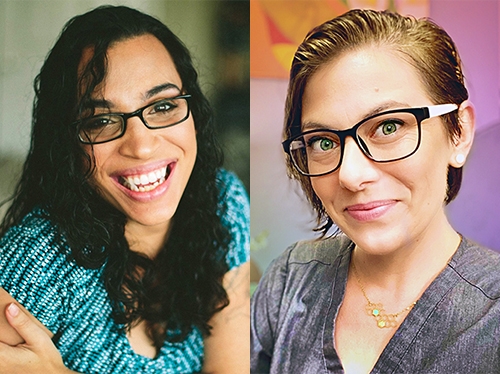

Shondra Mattos is an IBCLC (Internationally Board-certified Lactation Consultant) and owner of a Location-independent lactation practice where she provides breastfeeding and infant feeding support to families countrywide.
Shondra finds the science of lactation fascinating, and as such, she has a passion for sharing her understanding of complex lactation subjects with her colleagues and aspiring lactation students. When she's not with clients, speaking, or teaching, she spends time with her husband and daughter in Fayetteville, NC.
Bryna is a lactation consultant, mentor, educator, and birth doula in the Pacific Northwestern United States. They are active in their community as an advocate for mutual aid, reproductive justice, and reduction in barriers to care. They also own and manage an inclusive private practice. As a member of both Queer and Neurodivergent communities, offering inclusive care on every level is very important to Bryna. Their vision is to offer information and tools to providers to build a community of comprehensive, concordant, and individualized care for all families in the perinatal period.
We propose a talk that outlines the anatomy and physiology of normal infant feeding. Our talk will cover the basic functions of infant muscle groups recruited for latching, sucking, swallowing, and drinking human or artificial milk. We believe that if lactation professionals understand normal physiology as it pertains to muscle groups, they will better be able to educate and help the families our profession serves. At the end of this talk, the lactation professional will be able to establish a baseline for normal muscle function when evaluating the breastfed infant. We will use multiple learning modalities to outline and explain the essentials of muscle function in the breastfed infant.

View Details / Enroll

Back to Basics for Cleft Lip and Palate: An Overview of Strategies to Support Lactation in the Neonatal Period and Beyond

Alice Farrow is an IBCLC, writer, speaker, and infant feeding and health equity advocate. Parent of a child born with a cleft lip and palate, Alice has worked extensively, since 2006, with parents, parent organisations, cleft teams health providers and lactation specialists in order to increase awareness of the specific challenges faced by cleft affected infants and their families and to imprve access to adequate lactation support for this community.
Currently based in Rome, Italy, Alice advocates for, and teaches regularly on, the topic of breastfeeding/chestfeeding with an oral cleft via presentations, courses, articles, booklets and handouts and supports parents and professionals wordwide via their Cleft Lip and Palate Breastfeeding website and associated online support group, and in person and distance consultations.
A common misconception among care providers and families is that babies born with an oral cleft cannot breastfeed/chestfeed. This presentation corrects that misconception by exploring cleft types and their expected breastfeeding/chestfeeding outcomes and sharing tools that lactation specialists can use to more effectively support parents when their baby is born with a cleft lip/palate. In particular, during the neonatal period, the lactation specialist is uniquely positioned to support parents to make informed decisions about their feeding choices and create a going home care plan to help them achieve their breastfeeding/chestfeeding goals in the long term.

View Details / Enroll

View Details / Enroll












